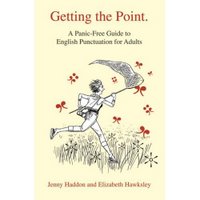November 2006
In this month's blog
The Caliph's House
Airport bookshops and business books
Alan Maclean, publisher
Cure for alcoholism
GOB on writing about what you know
My views on the veil debate
A Panic-Free Guide to Punctuation
Book-deprived children
The broadband experience
This time two years ago, just back from a trip to the Atlas Mountains in southern Morocco, I was starting to write a novel set there.
So when, at the Guille-Allès public library recently, I saw The Caliph's House : A Year in Casablanca by Tahir Shah on display on the second landing of the library's handsome staircase, I seized it. [The hardback edition has a different jacket from the paperback cover shown here.]

It was the most interesting, amusing library book I read last month. Each chapter begins with a Moroccan proverb - for example, "Tomorrow there will be apricots" - and the book is beautifully illustrated with drawings by Laura Hartman Maestro, an American illustrator who, unfortunately, doesn't seem to have a website for admirers of her work.
Tahir Shah is described by Doubleday, a division of Transworld Publishers, thus -
"Born in 1966 into a distinguished Afghan family (his father was the philosopher Idries Shah), Tahir Shah is the author of 10 books including Sorcerer's Apprentice, In Search of King Solomon's Mines and House of the Tiger King. A member of the Royal Geographical Society, he is also a documentary film-maker and photographer and lives in Casablanca with his wife and two children."
His wife, Rachana, who was pregnant when he decided to move to Casablanca, must be a remarkable woman to have endured the first year at Dar Khalifa.
Tahir Shah did not design his website and it suffers from hard to read white-on-black text and a too-fussy layout. But it's worth a visit. I should have liked to find a picture of the redoubtable Rachana and a tribute to her admirable supportiveness.
Airport bookshops and business books
Last month an excellent business columnist, Jeff Randall, wrote an article headed "The essential guide to screwing up your business".
It began, "If, like me, you spend too much time at overcrowded airports, waiting for Junk Air's delayed flight to nowhere, you'll be familiar with the depressing nature of departure-lounge bookshops. In addition to chewing-gum-for-the-mind biographies of reality-television rejects, they are invariably stocked with a wide range of "business" books.
I put the word business in inverted commas, because these publications are almost never about conventional commerce or finance. More often than not, what you get is a "how to" guide by an author whose only achievement, if we can so dignify it, is having produced the rubbish through which you are browsing.
Some are nothing more than hideous examples of a promise too far. You know the stuff: Make A Million In A Minute, The Winning Way To Fame And Fortune, Quit Work And Become Rich."
Alan Maclean, publisher
Also at the beginning of last month, the Book Trade News Digest, to which all keen bookworms subscribe, gave a link to The Guardian's obituary of British publisher Alan Maclean who was born in 1924 and died in September this year. The Scotsman and The Times also have obits.
 I particularly liked this paragraph from The Guardian. "At that time Macmillan was a 19th-century publishing house with only a precarious grasp on the 20th. It still occupied its purpose-built Victorian warehouse and offices just off the Strand in London. When Alan joined in 1954, Gone with the Wind, first published in 1939, was still selling in hardback at the full price. Publication expenses of each book were, literally, calculated on the back of an envelope and no minutes were kept of editorial meetings, a tradition that not infrequently resulted in confusion over publishing decisions."
I particularly liked this paragraph from The Guardian. "At that time Macmillan was a 19th-century publishing house with only a precarious grasp on the 20th. It still occupied its purpose-built Victorian warehouse and offices just off the Strand in London. When Alan joined in 1954, Gone with the Wind, first published in 1939, was still selling in hardback at the full price. Publication expenses of each book were, literally, calculated on the back of an envelope and no minutes were kept of editorial meetings, a tradition that not infrequently resulted in confusion over publishing decisions."Today Macmillan is owned by by the Verlagsgruppe Georg von Holtzbrinck, a German family company, and if you read the blog of Richard Charkin, Chief Executive of Macmillan London, you will be impressed or appalled by the punishing travel programme which goes with the job.
By the way, in Richard Charkin's blog on 21 October, he mentioned that he would be writing about Alan Maclean. Publisher Susan Hill commented, "Richard, I had no idea Alan had died. I knew him in the 1960s. He was a man of enormous charm who had battled with his own demons and won with tremendous courage. He married happily and then suffered an appalling blow with the death of his son Daniel. Life was not kind to Alan - and he had had to bear the burden of his name at a time when he was known as the brother of 'that Maclean' - the spy, as in Burgess and... He was one of the gentlemen of the book world and I am sad to hear news of his death."
The Guardian obit mentioned that "In 1997, he published a witty and elegant volume of memoirs to which he gave the title he had once devised in a dull meeting as the least saleable that he could imagine, No I Tell a Lie, It Was the Tuesday : A Trudge Through His Life and Times."
This sent me off to the online catalogue of my summer-time public library the Guille-Allès, where, to my joy, I was able to reserve the book, published by Kyle Cathie in September 1997, for collection next day.
Cure for alcoholism
Perhaps the most interesting part of this memoir is the chapter headed Around the World in 99 Cromwell Road in which the author describes his recovery from years of heavy drinking.
"I'd heard of an eccentric, elderly doctor called John Dent who was said to offer a swift chemical treatment with no psychiatric strings. He's successfully treated the film director, Anthony Asquith, the uncle of Mark Bonham-Carter, who'd been observing my drinking habits with increasing alarm."
Alan Maclean goes on to describe his treatment. "…punctually at four o'clock [on Friday], pleasantly blotto, I arrived by taxi at 99 Cromwell Road…The next two days were really a sort of endurance test - exhausting, uncomfortable and boring…by Tuesday morning my fading grasp on reality had gone altogether and I remained trapped in delirium for the next two days and nights…So I went back to work on Monday morning ready to start my strange new sober life."
In a Postscript to this chapter he relates how his boss, Maurice Macmillan, then took the same treatment. "Maurice completed the course in five days flat with no DTs at all, though he claimed a couple of minor fits. He went home on Christmas Eve and died sober 25 years later.
Dr Dent cured his patients by using apomorphine and, at the end of Alan Maclean's book, there is an appendix : an article on apomorphine treatment by Dr Dent, first published in The Medical Press in May 1961.
Today, apomorphine is used in the treatment of Parkinson's disease but, not apparently, in curing alcoholics or heroin addicts. When I Googled apomorphine, I learned that " [William] Burroughs produced the bulk of his writing after he moved to London and took an apomorphine cure under the direction of Dr John Dent."
Obituaries in The Times and The Scotsman did not mention this interesting aspect of Maclean's life.
GOB on writing about what you know?
On Friday, October 06, 2006 before reviewing two Macmillan New Writing novels, Grumpy Old Bookworm wrote, "For one thing, writing about 'what you know' leads to basing your characters on real people; and your friends, neighbours and acquaintances may not always appreciate that. There is a very real risk that some of them may consult Messrs Sue, Grabbit, and Runne. And that is not a matter to be taken lightly."
Sensible advice as far as characters are concerned, but writing about what one knows in the sense of places visited or unusual situations experienced can be a good thing.
For example, my first book was based on living in S E Asia during a period of terrorism. Because of that factual background, the book was bought for pre-publication serialisation in Woman's Own magazine for a then substantial fee.
My views on the veil debate
Last month the British politician Jack Straw was criticised for asking his Muslim women constituents to remove their veils during conversations with him.
This reminded me of Che Pah binte Hussin to whom my first book was dedicated. She was my amah or home help when we lived in an isolated tropical-style bungalow in "upcountry" Malaya, as it was then.
Pah didn't "live in". She came every day, trudging up a steep, narrow track from the nearest road, through thick vegetation I felt sure was infested with snakes. Pah's everyday clothes were a thin cotton kebaya and a sarong from waist to ankle. Her beautiful waist-length glossy black hair, usually pinned up in various forms of bun or chignon, was uncovered, as was the hair of all Malay women at that time. Sometimes she stuck a flower in her chignon.
I have never been back to Malaysia, as it is now, but I gather that today hair coverings are widely worn, which must be uncomfortable in such a hot, sticky climate as well as hiding all those beautiful heads of hair which were such a pleasure to look at during my time there.
Recently The Daily Telegraph reported that the heads of the French National College of Gynaecologists and Obstetricians had issued a public statement which included this: "Thirty years ago, Muslim women came into our hospitals without any alarm at being taken into the care of doctors, most of whom were men, and there were none of these difficulties. Why are things going backwards? It is for Islam to adapt to the liberties that all must possess in a modern state."
"Why are things going backwards?" seems the key phrase.
A Panic-Free Guide to Punctuation
Probably the last book I shall buy from a realworld bookshop for many months is Getting the Point sub-titled A Panic-Free Guide to English Punctuation for Adults by Jenny Haddon and Elizabeth Hawksley, published by Floris Books in September at £10, all but a penny.
Here are two passages from it. The first is from a story called Tales of the Whole Nut Café.
"Neil stepped in and took control. He took one look at the mouse and saw that it was a field mouse. It must have come in from outside, he decided; he'd noticed a small hole by the back door earlier. He made a note to ring the Council Pest Control in the morning, ordered Sundeep to plug the hole with a bit of wire wool, dropped a tea towel over the frightened mouse and released it outside."

The second passage is from a story called Dragon Deeds.
"Athelstan Silverwing was born an only dragon to elderly parents in Bats' Cave, Ben Eldris, Caledonia. Although he went to Cumbria as a young dragon and trained as a scale-polisher, his heart was always in Ben Eldris, and after his wife died and his dragonlets had grown up, he returned there. He leaves four sons and a daughter. He was 243 years old. Silverwings are unusual in having four nostrils, the top two are capable, with practice, of producing sound at very high frequency and it was by this means that Athelstan Silverwing communicated with the bats."
The third story in the book is Casanova on Love. I've always felt Casanova was a prize creep, but I liked Neil and Athelstan and recommend the book to people who can punctuate themselves but are looking for Christmas presents for people who can't.
John Clare on education
Back in November 1995, John Clare, who recently retired as The Daily Telegraph's Education Editor, wrote "The failure of primary schools to teach one child in three to read properly by the age of seven is the education system's greatest flaw. It is entirely inexcusable and the consequences are devastating, as much for the individual as for the community. Children who are not reading easily by the time they go to secondary school cannot cope with the curriculum and become increasingly demoralised. They are very likely to truant, abandon full-time education at 16 with few if any GCSEs, reject job training and join the ranks of the unemployed and unemployable - the Status Zero generation. Many turn to crime."

In July this year, Mr Clare was asked by a reader of his column, "Could you tell me what proportion of pupils have actually mastered the Three Rs by the time they leave primary school at 11?"
His reply included this, "…the proportion of boys who left primary school without having reached the expected level in reading, writing and maths was an astonishing 49 per cent (compared with 37 per cent of girls). Given that every child spends 6,000 hours in primary school, it does make you wonder what their teachers are doing…"
Even the boys and girls who reached the expected levels are probably not too hot on punctuation. Getting the Point could spare them a lot of embarrassment.
On the back of the jacket, there's a quote from Martyn Drain of the UK Career Academy Foundation.
'This book is just right for young adults entering work for the first time. The transition from "teenage text speak" to clear and effective business communication can be huge and many 16-19-year-olds struggle to bridge this gap. This practical book with light-hearted stories is a great guide and should be as essential as their iPod."
Also on the back of the jacket, there's a comment by Hilary Johnson who runs an authors' advisory service. "For years it's been hard to know what to recommend to the many of our clients who have difficulties with punctuation; I had resorted to recommending a children's book on the subject. Getting the Point is an easy-to-follow guide presented in imaginative and entertaining form."
Can you imagine aspiring to become a novelist, or any other kind of writer, if you don't know how to punctuate? Well, yes, if you're under 45, or even 55, you probably can. On several online authors' forums I visit, never a month goes by without a published or aspiring author's posted comment including a grammatical boner or spelling mistake.
For a time I kept a list of these horrors, but I can't publish it here because the forums are private and members can't be quoted without permission, which they're usually happy to give but obviously not in these circumstances.
Book-deprived children
When my two-year-old grandson comes to lunch and we snuggle up to re-read a long out of print copy of The Brown Bear Book [first published by Golden Pleasure Books in 1947 but the Bookworm family edition is dated 1964] I wonder how many of his contemporaries will have the luck to grow up in houses crammed with books and with parents and grandparents for whom reading is an essential part of life.
The broadband experience
My first experience of broadband, starting in May, has not been a happy one. Faster downloads at websites have been counterbalanced by some incoming emails bouncing and outgoing emails not reaching their destinations. My summer service provider says this is not their fault but that of the US company who forward emails sent to my dot com address to whichever SP I am using.
I have been with this forwarding since 1999 and excellent service they have given. However, earlier this month they emailed, "Unfortunately we have been experiencing an above average volume of spam that has ultimately impacted the delivery of some of those forwarded emails. While we are working diligently to fix this issue, we can not provide you with a timeframe for when the issue will be resolved."
If you wish to contact me privately, try anne@anneweale.com and, if the email bounces, anneweale@yahoo.com
More book news in December.
